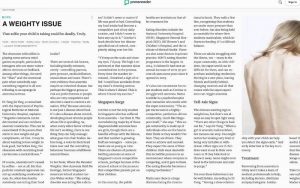Feeling more no no no than ho ho ho this Christmas holiday? We hear you
Text: Maria Luedeke
Have you decked the halls with boughs of holly? Been dreaming of a white Christmas? Rocked around the Christmas tree? December is famously touted as The Most Wonderful Time of the Year, but with it comes a lot of pressure to feel happy when for many it’s an especially challenging time. This year in particular, many people are struggling with sadness and loss. If your mental health at Christmas feels more meh than merry, you’re not alone.
Loss is at the core of grief and there has been so much of it throughout 2020 — loss of planned holidays, loss of jobs and income, loss of loved ones due to Covid-19 (and other non-pandemic issues), loss of celebrations like graduations, weddings, holidays and the general loss of life as it was known to us. It’s important to acknowledge that things might not be so merry and bright and that our mental health has taken a hit, but also to remember that we can take action to avoid slipping into a holiday black hole.
Here are 10 ways to protect your mental wellbeing at Christmas and challenge the festive blues.
Focus on self-care
The Christmas holidays can be a very hectic, busy and stressful time with workloads, family obligations, festivities arrangements, errands and holiday events. While it seems like the worst time to try to show yourself some kindness it is actually the most crucial time to care for yourself. Schedule time to go to the gym, write in your journal, paint, play music, read something you enjoy (even if it’s only for 15 minutes), pray, meditate or do whatever you need to do to remember your purpose and reason for being. Neglecting self-care only leads to a deficit that results in emotional and physical illness so prioritise yourself.
Make connections
Spending time with people who you value and who value you, whether it is online, on the phone or in person is the most vital thing to human beings. Connection with others is one of our base needs, so making the effort however small to connect with other people can lift our mental health at Christmas and boost our spirits.
Create new Christmas traditions and adapt old ones
Traditions are important to us as they bind generations together, honour customs and history and mark occasions that are special to us. It may not be realistic this year to engage in Christmas traditions the way you usually do, so look at ways you can either adapt them to your current circumstances or create brand new ones to reflect a different time.
Immerse yourself in nature
Research has shown that being in nature reduces stress, anxiety, and boosts brain connectivity and creativity. It also increases our ability to connect with others and improves our focus and concentration. Since we live in the “Garden City of Singapore” with over 350 parks on our little island, there’s ample opportunity to get out in nature and improve your wellbeing and mental health at Christmas.
Move your body
Everyone knows that exercise releases endorphins which are our feel-good hormones, but simply moving your body changes your brain Think of a video of someone who is sad — you’d probably imagine them moving slowly and dragging themselves around. If you think of someone who’s highly anxious, you’d probably imagine them rushing around, having quick, jittery movements — the brain-body connection is a two-way street. Just by changing your posture or breathing you change how your brain works. So, even if you’re not up to an intense HIIT workout, going for a stroll can be effective in shifting your mood and thoughts.
Reach out for help
Everyone needs help sometimes and there is no reason to ever be embarrassed or ashamed to reach out for it when you need it. It may mean calling a friend or colleague and letting them know you’re feeling sad, scared and alone and just need someone to sit with. Or you may need more focused help like a counsellor or doctor. Alternatively, you can try Samaritans of Singapore or Beyond the Label.
Be a help to others
Seeing how you can help others in need this Christmas holiday creates a way to identify the innate strengths and gifts we all have even when we may feel at our lowest. Volunteering to read books to the elderly (online to keep everyone safe), helping to prepare meals or delivering them, or shopping for those who cannot, gives people a sense of purpose, belonging and community. Research tells us that volunteering reduces rates of depression, imparts skills and builds new relationships.
Ditch social vampires
Focus on the things in life that energise you and limit those that drain you. Social expectations are high at the holidays and even “fun” is tiring. We have the same physiological reaction to excitement as we do to things we perceive as stressful. We need to build in moments of recovery (see #1!) to protect our mental wellbeing and allow our mind, body and soul to recharge. Conversely, it’s perfectly okay to say “no” to the stressors that we know drain us. The idea is to create as much balance as possible; much like our bank accounts, we need to put in deposits of positivity and limit the withdrawals.
Allow yourself moments of sadness and grief
There’s no way to ignore that this year in particular has been full of losses, unmet expectations and uncertainties. It all amounts to feels of sadness and grief which need to be acknowledged. The key is to have boundaries with those moments so you don’t get lost in them. Use a journal each day to write down the sad thoughts but set a timer for 15 minutes to limit the time. That way you allow a time and space for your sadness without allowing it to overwhelm all the moments of your day.
Focus on gifts
No, not the Christmas ones wrapped up under the tree — the things that you’re grateful for, the gratitude you’ve developed for your health, your strengths, your loved ones and any of the things that may have been threatened this year. Often, it’s only when we don’t have certain things/people/freedoms that we truly appreciate and value them.





